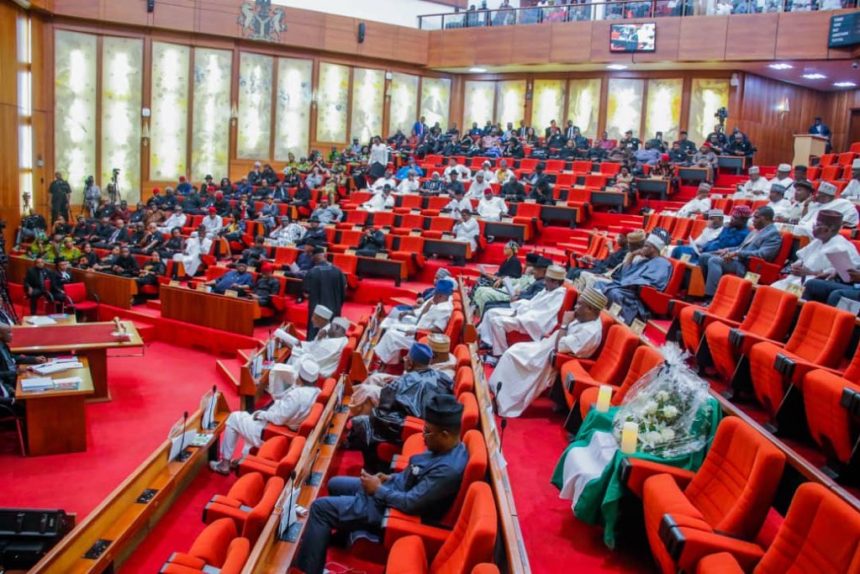The Nigerian Senate descended into a stormy session on Wednesday as a contentious debate over the federal government’s proposed tax reform bills sparked sharp disagreements among lawmakers.
The session, presided over by Deputy Senate President Jibrin Barau, turned chaotic when Senate Leader Opeyemi Bamidele announced plans to admit a federal government team into the chamber to present the landmark tax reform proposals.
The visitors, led by Dr. Zacch Adedeji, Chairman of the Federal Inland Revenue Service (FIRS), included Tanimu Yakubu, Director General of the Budget Office, and Mr. Taiwo Oyedele, Chairman of the Presidential Committee on Fiscal Policy and Tax Reforms.
Their mission was to brief lawmakers on four key tax reform bills aimed at overhauling Nigeria’s tax system and introducing measures to provide relief for low-income earners and small businesses.

Trouble began when Bamidele invoked Senate Order 12 (1) to suspend regular rules and admit the guests. This move drew immediate opposition from Senator Abdul Ningi, who questioned the legality of the decision, citing Senate rules that outline specific categories of individuals allowed into the chamber. While Bamidele clarified that the suspension of Order 12 was intended to permit the visitors, the debate became more heated.
Related Posts:
Deputy Senate President Barau defended the invitation, arguing that the presentation was necessary to educate both lawmakers and the public on the proposed tax reforms.
Minority Leader Senator Abba Moro seconded the motion, and the Serjeant-at-Arms escorted the federal government officials into the chamber. However, the situation took a dramatic turn when former Senate Chief Whip Senator Mohammed Ali Ndume raised strong objections.
Ndume argued that the tax reform bills were not listed on the Order Paper for the day’s session, a violation of Senate procedures. He insisted that discussing such a significant matter without proper documentation undermined legislative integrity. “This is too important a matter to bypass established protocols,” Ndume declared, urging his colleagues to prioritize transparency and due process.
He emphasized the sensitivity of the tax reforms, noting the overwhelming public interest and concerns. “Our people are watching. Nigerians have spoken, and we must respect their voices. Matters like these cannot be rushed or handled carelessly,” he said, stressing the need for a supplementary Order Paper to properly reflect the matter before discussion.
Despite Ndume’s fervent plea, Barau dismissed his objections, ruling him out of order and allowing the presentation to proceed. Barau accused Ndume of engaging in unnecessary rhetoric, asserting that the Senate was well within its authority to admit the guests and discuss urgent national matters. This ruling further inflamed tensions, leading to a rowdy chamber as lawmakers voiced their frustrations.
Once order was restored, the federal government team addressed the Senate, presenting the four proposed tax reform bills: the Nigeria Tax Bill, the Nigeria Tax Administration Bill, the Nigeria Revenue Service Establishment Bill, and the Joint Revenue Board Establishment Bill. They explained that the bills sought to modernize Nigeria’s outdated tax laws, simplify the country’s complex tax system, and enhance revenue generation.
The team emphasized that the reforms were designed to be pro-poor, exempting low-income earners and small businesses from income taxes while streamlining tax administration for greater efficiency. They assured lawmakers that the reforms aimed to stimulate economic growth, reduce inequality, and align Nigeria’s tax system with global best practices.
Despite the assurances, the tension in the chamber underscored deep divisions among lawmakers regarding the handling of the tax reform debate. While some senators welcomed the reforms as a step toward economic modernization, others remained skeptical, calling for a more inclusive and transparent approach to legislative deliberations.
As the session closed, it was clear that the debate over Nigeria’s tax reforms was far from over, with lawmakers and stakeholders bracing for further discussions on one of the most contentious policy issues in recent times.



